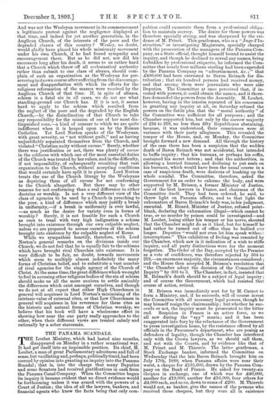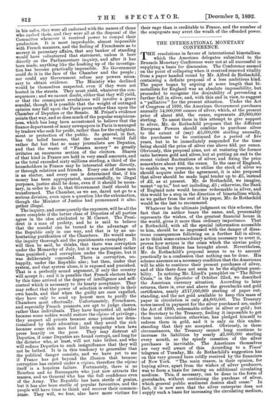THE PANAMA SCANDALS. T HE Loubet Ministry, which had lasted nine
months, disappeared on Monday in a rather sensational way. It had got itself into an impossible position. Its chief, M. Loubet, a man of great Parliamentary adroitness and full of sense, but vacillating and, perhaps, politicallytimid, had been coerced by opinion into granting an inquiry into the Panama Scandal ; that is, into the charge that many Deputies and some Senators had received gratifications in cash from the Panama Canal Company. When the Committee began its inquiry it became evident that no direct evidence would be forthcoming unless it was armed with the powers of a Court of Justice ; the idea of all the lawyers, bankers, and financial agents who knew the facts being that only com- pulsion could exonerate them from a professional obliga- tion to maintain secrecy. The desire for those powers was therefore specially strong, and was sharpened by the evi- dence of M. Prinet. This gentleman, who is a " Juge d'In- struction," or investigating Magistrate, specially charged with the prosecution of the managers of the Panama Com- pany, as a State official, thought himself bound to assist the inquiry, and though he declined to reveal any names, being forbidden by professional etiquette, he informed the Com- mittee that nearly four millions sterling had been expended by the Panama Company on " advertisement, .k.e. ; " that £400,000 had been entrusted to Baron Reinach for dis- tribution ; that six hundred persons had received money, and that among them were journalists who were also Deputies. The Committee at once perceived that, if in- vested with powers, it could obtain the names, and it there- fore demanded the powers from the Assembly. M. Loubet, however, having in the interim repented of his concession in granting any inquiry at all, on Saturday refused the powers on the futile plea that the " moral authority " of the Committee was sufficient for all purposes ; and the Chamber supported him, but only by the narrow majority of 234 to 218, no less than fifty Republicans abstaining, because, it was understood, their consciences were at variance with their party allegiance. This revealed the temper of the House, and, on Monday, the Committee brought forward a new demand. All through the history of the case there has been a suspicion that the sudden death of Baron Reinach was not accidental, but intended to baffle inquiry ; that his bureaux, or perhaps his coffin, contained his secret letters ; and that the authorities, in allowing a hurried funeral, and declining to put seals on his bureaux, which would have been the usual course in a case of suspicious death, were desirous of hushing up the whole scandal. The Committee, therefore, asked the Government for an order to exhume the body, and were supported by M. Brisson, a former Minister of Justice, one of the best lawyers in France, and chairman of the Committee itself. They had been ordered, he said, to throw light on Panama affairs, and to that light the exhumation of Baron Reinach's body was, in his judgment, essential. M. Ricard, Minister of Justice, refused point- blank, declaring the exhumation illegal—which cannot be true, or no murder by poison could be investigated—and M. Loubet, losing either his temper or his nerve, shouted that the Chamber might do as it liked, but for himself he had rather be turned out of office than be bullied any longer. Deputies "would not even let him speak without interruptions." This exhibition of feeling was resented by the Chamber, which saw in it indication of a wish to stifle inquiry, and all party distinctions were for the moment forgotten. The Order of the Day, accepted by the Premier as a vote of confidence, was therefore rejected by 304 to 219,—an enormous majority, the circumstances considered ; and the House then accepted M. Brisson's resolution that "the Chamber adopt the decision of the Committee of Inquiry" by 303 to 3. The Chamber, in fact, insisted that M. Reinach's death should be a subject of legal inquiry ; and of course the Government, which had resisted that course of action, retired.
M. Brisson was immediately sent for by M. Carnot to form a Ministry, and, if he succeeds, will of course invest the Committee with all necessary legal powers, though he may himself resign the chairmanship ; but whether he suc- ceeds or not, the inquiry must be prosecuted to the bitter end. Suspicion in France is an active force, as we all saw during the " spy " mania ; and it has been exaggerated into fury by the reluctance of the Government to press investigation home, by the resistance offered by all officials in the Procureur's department, who are posing as defenders of legality, though the Chamber has interfered only with the Crown lawyers, as we should call them, and not with the Courts, and by evidence like that of M. Prinet and M. Thierree. The latter gentleman, a Stock Exchange banker, informed the Committee on Wednesday that the late Baron Reinach brought him on July 17th, 1888, when Panama affairs were near their worst, a cheque for £135,600, drawn by the Panama Com- pany on the Bank of France. He asked for twenty-six cheques in exchange, one of which was for £40,000, another for £19,000, another for £16,000, four others for £4,000 each, and so on, down to sums of £200. M. Thierr6e would not, as banker, give the names of the persons who received these cheques, but they were all in existence who cashed them, and they were all at the disposal of the Committee whenever it received power to compel their production. It is most improbable, almost impossible with French manners, and the feeling of Frenchmen as to secrecy in pecuniary affairs, that any banker of standing sary, in order to do it, that Government itself should be meant " up to," but not including, ; otherwise, the Bank transformed. The Chamber, as we see, dared not go to a of England note would become redeemable in silver, and -serious division, even upon a question like the exhumation, this would be a step in the direction of bimetallism which, though the Minister of Justice had pronounced it alto- as we gather from the rest of his paper, Mr. de Rothschild gether illegal. would be the last to recommend. The inquiry, and consequently the exposure, will be all the Whatever be the ultimate judgment on this scheme, the more complete if the better class of Deputies of all parties fact that its author bears the name, and, presumably -agree in the idea attributed to M. Carnot. The Presi- represents the wishes, of the greatest financial house in -dent is a man of probity, and he is said to believe the world, gives it more than ordinary importance. That that the scandal can be turned to the advantage of a Rothschild, with all the special information accessible the Republic only in one way, and that is by an un- to him, should be so impressed with the danger of disas- hesitating purification of the Chambers. He would make trona consequences following on a further fall in silver, the inquiry thorough and the punishments exemplary. It as to think some extraordinary action necessary to avert it, will then be said, he thinks, that there was corruption proves how serious is the crisis which the unwise policy under the Monarchy of July, but it was patronised rather of the United States has brought about. Nevertheless, than punished ; and corruption under the Empire, but it Mr. de Rothschild's proposal seems to us to amount was deliberately concealed. There is corruption, un- practically to a confession that nothing can be done. His happily, under the Republic also ; but then, under that scheme assumes as a necessary condition that the Americans system, and that system alone, it is exposed and punished. will be able to continue their present purchases of silver, That is a perfectly sound argument, if only the country and of this there does not seem to be the slightest possi- will accept it; and it is possible that French electors have bility. In noticing Mr. Lloyd's pamphlet on " The Silver by this time arrived at the degree of intelligence and self- Crisis," in the Spectator of October 22nd, we described control which is necessary to its hearty acceptance. They the American currency situation. According to later may reflect that the power of selection is entirely in their returns, there is, over and above the greenbacks and gold own hands, and that when the guilty are once expelled, certificates, nearly £117,000,000 sterling of paper out- they have only to send up honest men to purify the standing, and the net gold available to keep this mass of Chambers most effectually. Unfortunately, Frenchmen, paper in circulation is only £4,800,000. The Treasury and especially French peasants, are apt to judge classes, notes issued in payment for the silver purchased are, under rather than individuals. They have boycotted all nobles the Act of 1890, redeemable either in silver or gold ; but because some nobles would restore the regime of privilege ; the Secretary to the Treasury, finding it impossible to get they suspect all priests because some priests are dena- them into circulation otherwise, has pledged himself to tionalised by their education ; and they avoid the rich redeem them in gold, and it is only on this under- because some rich men feel little sympathy when laws standing that they are accepted. Obviously, in these press heavily on the poor. They may distrust all circumstances, the Treasury cannot long continue to Deputies, if some Deputies are found corrupt, and long for increase its liabilities by nearly £1,000,000 sterling the dictator who, at least, will not take bribes, and who every month, so the speedy cessation of the silver will reduce Deputies to such insignificance that they will purchases is inevitable. The Americans themselves not be bribed. It is in this tendency to generalise that are very well aware of this. According to a Times' the political danger consists, and we have yet to see telegram of Tuesday, Mr. de Rothschild's suggestion has if France has got beyond the illusion that because on this very ground been coldly received by the financiers corruption has existed under a regime, therefore the regime of New York. " The main reason, in their opinion, for itself is a hopeless failure. Fortunately, there is no buying silver, apart from the wishes of silver producers, Bourbon and no Buonaparte who just now attracts the was to form a basis for issuing an additional circulating masses, and no General who has the full confidence even medium. This, if necessary, can be done in the form of of the Army. The Republic has been sterile of genius, greenbacks, without continuing the purchase of silver, but it has also been sterile of popular favourites, and the which general public sentiment desires shall cease." In people will have time to think and recover their common- fact, it is now seen that the silver enterprise does not .sense. They will, we fear, also have more victims for supply such a basis for increasing the circulating medium, in his safes, they were all endorsed with the names of those their rage than is creditable to France, and the number of the scapegoats may avert the wrath of the offended power.



















































 Previous page
Previous page